Opera director Crystal Manich. Photo by Laura Marie Duncan Photography.
This interview has been syndicated with permission from the Twin Cities Arts Reader.
Boston Lyric Opera’s new production of Tosca, a co-production with Opera Omaha, opens October 13 at the historic Cutler Majestic Theatre in Boston. Its director is Crystal Manich, a vibrant force in the world of opera stage directors. Over the last decade, her directing career has taken her across the United States and as far south as Argentina, producing a repertoire of striking productions.
When reviewing a 2013 production of The Return of Ulysses that she directed, the New York Times‘ James Oestreich praised her direction as “imaginative, freely mingling modern and antiquarian touches in the sets and costumes, and making clever use of shadow play.” The Arts Reader‘s Basil Considine spoke with Manich about her work, going back to source materials, and career preparation for the world of opera.
Where am I catching you today?
I’m in an apartment on Boylston [Street] that Boston Lyric Opera provides for out-of-town artists. At this point in the process, we’re rehearsing in the afternoon and evening. We just finished sketching Act I yesterday. We’ve gotten a little bit into Act II, but we’re going to get even more into it today.
Act II is very exciting to work on – it’s the act I’ve been waiting to direct my entire life. It’s a very exciting piece of theatre to direct, whether you’re a director of opera or a director of theatre – or, in my case, both.
From the moment I learned of Tosca when I was 15, I was deadset on directing it…but especially Act II. It’s a dream come true for any director. This piece is so character-driven; Puccini really does that well in his other shows as well, but there’s something that I find especially true [about that statement] in Tosca.
This is your first time directing Tosca, correct?
Yes.
But you’ve done Puccini operas many times before, so this isn’t exactly your first engagement with him…
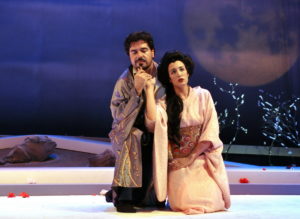
Puccini, for me, was my entry into opera. Tosca was the first opera recording I ever listened to, and he was responsible for many of my debuts, like my big house debut at Pittsburgh at Pittsburgh Opera, and my international debut in Buenos Aires, Argentina with Madame Butterfly back in 2010…
He’s kind of that composer that anytime I come back to him, it just feels like an old, familiar friend. The contents of his operas are always different [from each other], but there’s an interesting common thread throughout all of them in terms of character – something I think he does really well.
You’re represented by Abrams Artists Agency, so to what degree is this focus on Puccini a specialization that you’ve sought out, versus one that’s simply happened by coincidence and other people seeking you out?
The Puccini specialization is something that’s just continued to come up. It’s not something that I’ve actually pursued – I think very few directors have the opportunity to pursue jobs and get jobs that are that specific, although I’ve done a lot of 17th and 18th century works and keep getting hired for that.
Like everything in this business, I think it has to do a lot with word of mouth, box office success, and audience reaction. While everyone in the business says reviews don’t make or break a career, I do think that word of mouth is very powerful in the business and has gotten me a lot of repeated [directing] work in these two repertoires (Puccini and Baroque operas).
Although you didn’t mention it, you’ve also worked on a fair number of 20th-century operas as well – Moby Dick, for example, and Lighthouse. Is this something where someone has, more or less, just approached you and you said yes?
Well, I just did Cunning Little Vixen–
Janáček’s dead, so he really doesn’t count.
Point – but I assistant-directed Moby Dick and Lighthouse. These were not projects that I actively sought out working on as a director, but which I assistant-directed because I was interested in seeing what that they were about. (Of course, I’m in love with Jake Heggie’s music and really appreciated working with him.)
I’m really interested in directing new works in the future and have a few irons in the fire, because I’m a firm believer that the operatic form needs to change. People speak of its need to “be relevant” to an audience. Something related that I’ve been saying in Tosca rehearsals is, “We need to find the modernity in the period – what is relevant to our contemporary audiences and circumstances that we can find and bring forward?”
Creating new works is essential to the life of the art form: that we keep challenging how we do opera and what we show audiences. I think it’s essential that we ask these questions, whether the opera is old or new. I’m not the kind of director who says, “I’m going to direct Tosca just because I know how it goes and we’re going to do it the way everyone knows it, and so we’ll just rehearse three hours per day and it’ll be fine.”
I’ve never been that kind of director. Whether it’s Tosca or a contemporary piece, I’m trying to seek out and try to find that special thing that perhaps no one has thought of or that I haven’t seen before. It’s essential if people are coming back again and again to the same operas. It’s something that we need to think about each time.
So you’re saying that I won’t see a bunch of candlesticks being placed next to Scarpia’s head after he’s stabbed?
You know, that is a real good question: [what to do with] the traditional aspects of these shows. I will say this: I’m not ignoring the tradition, but I’m trying to slightly change the expectations that people have about the tradition. (Not to be cagey, but I want to leave the mystery of Act II there – we haven’t staged it yet, but I have a clear idea about what I have to do.) There are lots of moments in Tosca where I want to acknowledge that tradition in some way, but also turn it slightly so that there’s a new meaning attached to it.
Can you sketch out your path that brought you to your professional directing debut in Pittsburgh?
I started assistant-directing opera right out of school, and started at Opera Theater of Pittsburgh (the smaller of the two opera companies there). I then moved to NYC and started apprenticing with American Opera Projects. Then Pittsburgh Opera – the bigger house – called me about assistant-directing their entire season. I ended up going back and forth between New York City and Pittsburgh for two seasons to assistant-direct.
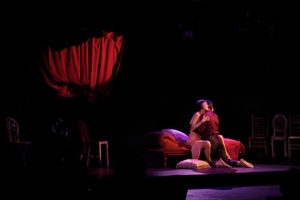
By the end of my second season at Pittsburgh Opera, I’d started a baroque opera company in New York: Opera Omnia. We were planning do The Coronation of Poppea and produce it in 2008; while that was happening, Pittsburgh Opera offered me the opportunity to direct La Bohème in 2009. Technically, Poppea was my professional directing debut in 2008, followed by Bohème in 2009.
Something that’s really great about Pittsburgh is that it’s the city I grew up in, it’s where I went to college, and it’s where I’ve had many professional important moments in my life. A lot of directors and performers lament that their home towns don’t give them love, but I certainly can’t say that – I owe much of my professional success directly to my home town.
Continuing on that theme, networking is certainly very important in the opera business. At the same time, it’s become more common than in previous decades for people to move around the country and even around the world in the course of their career. There are certainly some advantages, but it does make it harder to develop that sort of local network that takes years and years and years. Do you have any suggestions for singers and directors working in this field and trying to cultivate their networks?
It’s probably more difficult than ever because there are so many more of us than there were 30 years ago. There are also so many ways to get a degree; because of the oversaturation of these arts programs, there are just more people in the market and a lot are very qualified. There’s just not enough room for all of us.
I really do stand by my idea that I have a special quality to my work that I really stick to. My advice to people is, “Stick to your guns on what you do well, and what you think you could continue to do well.” I think that’s what has sustained me; I’m not going to pretend to be someone I’m not just because you think it’ll get you on Broadway or something (first of all, it’s not that easy; second of all, I think that if you’re not true to yourself as an artist, you won’t find ways of successfully managing your career).
I don’t think a day passes in my life when I don’t worry about what I’ll do next year as an artist, since I have no idea. There are a couple irons in the fire, but nothing’s really certain. It’s that uncertainty that drives me, oddly enough, but that’s not for everyone. It does drive me, however, and forces me to reevaluate how I approach shows.
I try to approach each one differently. I’ve directed La Bohème five times, but I’m always going back to the source material and looking at how to keep it fresh with the people I’m working with. That’s my advice: keep working on yourself, because yourself is what’s brought to the table when you’re interpreting these characters and these stories.
Speaking of coming back to things and keeping it fresh, this isn’t your first time working with Boston Lyric Opera. You’ve worked with them many times over the years, during which the Boston opera scene has changed substantially, both in terms of who’s doing opera and where they’re doing opera. A few companies have come and gone, Boston Lyric has looked at some different places to do opera, and of course there’s been some staff turnover. What’s it like coming back?
I’ve been with the company for six years. It’s exciting coming back – I find a company like BLO very admirable – a company that is constantly trying to evolve in how the opera environment in light of how the city opera environment has changed. I think they’ve done a great job of doing that and finding it.
With this Tosca [production], it was proposed to me from the beginning that the orchestra be placed on-stage. Instead of balking at that or conceiving that it would just be impossible, I leaped at the opportunity. It’s a unique opportunity to do Tosca in a different way, and I really applaud their unapologetic effort to do the works they want to do, and the way that they need to be done, based on the space availability in a city full of vaudeville theatres. That’s a unique thing about working in Boston – I’ve never worked in another city where every theatre has such small wing space and limited fly spaces.
Come to the Twin Cities – we have lots of those, built in the 1910s, 1920s, and 1930s, with wing space only on one side.
Oh, really? My lighting designer, who I’ve used for all my productions here [at BLO], is Paul Hackenmueller. He is from Minneapolis and lives there when he’s not working on out-of-town shows.
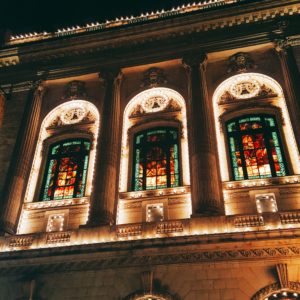
[In terms of old theatres,] it’s important to talk about stage technologies and how they’ve evolved, especially on Broadway. Broadway spaces are small, but they’ve figured out how to make that work for them, economically. In this same way, Boston companies have figured out how to use these historic theatres work. We’re happy to have them – I think tearing them down would be a real shame – but we have to figure out how to do our work in them, given the contemporary climate of what’s expected in this show. I really do applaud BLO for this.
I do love coming back to direct in this city. I’ve also directed for New England Conservatory and will be directing at Boston University in January.
Which production?
Albert Herring, at the Boston University Opera Institute.
Full disclosure, I went to BU for seminary and my PhD…
Ah! I got into BU for undergraduate, but ultimately I chose Carnegie Mellon for directing. It’s a town that keeps calling me back.
Sometimes it’s a multi-year courtship.
Exactly!
You also received a master’s degree in arts administration – where was that in your schooling process?
I got that at Carnegie Mellon as well. They have a great program where if you’re already an undergrad and have a certain GPA, you can apply for this [combined bachelor’s/master’s) program and are almost always accepted. I decided in my junior year to apply, so that I could overlap my studies and finish both my master’s and bachelor’s in a total of just five years.
Something that I gained from doing the MA was a real sense of how things work financially. I think this is one of the things that’s contributed to my repeat invites to do more shows with [the same] companies: I’m always thinking about how to manage the chorus rehearsal to save the companies money. I think of things like, “Can I do this thing with the chorus in this rehearsal now, or should I release them and save the company money on their rehearsal budget, and work it into another rehearsal?” I’ve done that many times and been in solidarity with the company on their financial budget.
Of course, as a director for new productions, there are always slashes that have to be made in your initial dream for a production that you propose. We certainly had to make cuts to my vision for this Tosca – every show has cuts. Being able to be flexible and understanding of that need is important. It doesn’t mean you don’t push on some things, but there’s a lot of give and take when it comes to realizing the image that you have in your head.
For me, also, I’m looking to the future in trying to figure out if I want to slow down my freelance directing career. It is a stressful career, and I do think about [how I could apply my arts management experience to] potentially contribute something interesting [and valuable] to a company. Long-term things like that have been on my mind ever since I got the degree.
You’ve mentioned that you look at the source material for other operas that you direct, like Bohème. With Tosca, you have the Sardou play available, but as with other operatic adaptations, there’s some material that’s been trimmed out, condensed, etc. These differences can add up to be quite significant – how have you engaged or not engaged with the source play?
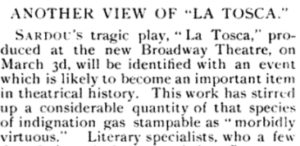
I have totally engaged with the play. The big challenge, however, is that there’s very little information about the Sardou play in English. You have to do a lot of scholarly reading about the play [to learn things], but I can read French well enough to get about 70% of it. As a result, I was able to take the play and take in [important] information that’s not in the opera, like Cavaradossi’s background – that he’s actually from Paris, for example.
Details like this aren’t things that you can’t infuse [directly] into the production…it’s not something that you can play to the audience directly, but it certainly informs the character that he’s from Paris and from a noble background. There’s also a really important reference in the Sardou play where Cavaradossi is speaking to a friend of his where it becomes clear that he has a really idealized view of Tosca and where she came from – that she was found in an idyllic pastoral setting by nuns when she was 13. This idealized view shows you how he views her and puts her on a pedestal; I’m not going to tell you more about how that is used in the staging, since I think that the audience will pick up on it, but I really latched onto that idealized view of Tosca.
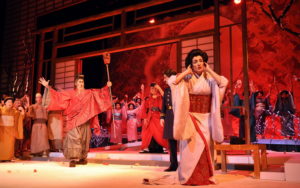
I think the source material can really help infuse detail and background into an opera. There’s a similar scene in the source material for Madame Butterfly, where she puts his slippers down and pulls out his chair in the play – so it’s something I’ve done in the opera twice, now. It’s those little details that really bring out nuances of character. It may be really subtle and something the audience just accepts as a character trait; they may or may not know if such an instruction exists in the libretto. Even if they’ve memorized the operas, I hope that as audience members, they’re open to whatever comes to them. If they’re new to the opera and get these details, it’s even better.
Tell me a little bit about your studies and directing in particular. One of the things that you often hear from people who came to opera from a singing track (versus people who came to opera from a musical theatre background, say) is that a lot of directors don’t read music or speak the foreign language, and thus depend on recordings for their knowledge of an opera. Given the cuts generally made to fit an opera on CD, this can sometimes be very hazardous.
Absolutely.
What sort of training did you have to prepare you for directing opera during your studies at Carnegie Mellon?
I had a lot of training. [Before that,] I did some music studies as a kid – played the flute and piano very badly for a while. I discovered the theatre when I was 12 (but with a dance background before that), discovering musical theatre first. I then discovered opera with Tosca at 15.
My life’s goal was first to be an actress, then a director, then a director who understands music. I believed very strongly that I had to go to school for directing theatre, because for me the basic knowledge of how to direct stories on stage in theatre can apply to anything.
I’ve now done a number of theatre things that have made me realize that the text analysis that I do in opera is no different from how I approach the text in a straight play. When you’re trying to get to the heart of the story, the searching for events and beats is all the same – but in opera, you also have the whole character of the orchestra. In opera, the orchestra needs to be taken into consideration in a major way because there’s so much nuance and detail to be gained from really studying that aspect and knowing your stuff.

At Carnegie, I spent a lot of time to develop this [foundation]. I took a music reading class, I studied abroad to learn Italian (I spoke Spanish because of my Puerto Rican background, so Italian came very easily). While I was in Italy, I also studied opera history, and was able to get a nicely fleshed-out overview of opera and how it began and developed into the 20th century.
When I came back from studying abroad, I got involved in productions at the Carnegie Mellon School of Music, and got involved in directing scenes and Stravinsky’s The Soldier’s Tale. I was definitely focused during my studies on trying to get as much as possible of this type of experience.
I’ve mostly been directing opera for the last 10 years, and it’s still so satisfying. I’m the sort of person who wants to do it all – I’d love to direct a film some day and a big budget musical. It’s part of my personality to have all that desire and want to get as much as you can, as best as you can.
In many ways, opera is the most difficult art form because there’s so much to consider – so many people in the room. There’s the conductor, there’s me, the designers, the singers (who have the really impossible task of thinking and feeling in a foreign language and convey that to the audience). All these things make me want to keep pursuing it, but it also imposes challenges with communicating to the audiences.
Some people say, “But the translation’s up there [in the supertitles].” Other people will counter, “Languages can alienate people”. I’m always fighting against that conflict: I say, “If you come to one of my operas and don’t look up at the supertitles, I want you to get 80% of the story.” I try to direct for non-opera people first; the way that you do this is assume that the audience has no idea what the story is about. I always try and approach it in that way: in the freshest way possible.
How do you ensure that?
For me, when I do an opera for the first time, it’s important that I don’t watch any videos. I don’t do any of that stuff – I just go to the text and the music, and extract my first-time experience of it, just as a first-time audience member would. (I have, of course, gone to live performances, but that’s different. I think that watching videos is a real trap and dangerous for your creativity as a director – you can’t see details and feel nuance, because the camera is either too close or too far away. The feeling that you have in a hall when experiencing something is going to completely change your point of view in a way that video just doesn’t capture.
With this in mind, do you watch the Metropolitan Opera’s HD broadcasts in movie theatres?
I’ve seen a few over the years, yes.
Would you say that the same things that you just said apply to these broadcasts?
I wouldn’t. I’d say that the HD experience is unique unto itself. Of course, your view of the performance is “tainted” – I’m not saying that as a negative connotation, but it is different from being in the hall.
When I go to the HD broadcasts, I go in knowing that we’re seeing a different perspective of how opera could be: it becomes film-like. You’re watching someone so close that it can come off as being “strange”. This closeness sometimes gives off an impression about the art form where people can end up feeling that it’s fake.
I do think the HD broadcasts have a place and have created a new genre within the world of opera, and that they’ve helped reach people who can’t otherwise get to opera in New York. In that light, I’m all for it, but it has to be acknowledged that it’s a totally different experience to see something live and see something on a screen.
Let’s talk about Opera Omnia. Is it still actively operating?
Not right now. We haven’t produced anything since 2013, so it’s on an indefinite hiatus. The three of us who started the company were much less employed at the time than we are now. Back then, we were all fledgling artists living in NY; we’ve now gone on to do much more out of town.
Self-producing is very fulfilling, but it’s also very consuming and you have to be around to do it or it’s impossible. For the past few years, I’ve been on the road for perhaps 10 months out of the year, so there’s a good reason that we’ve gone on indefinite hiatus!
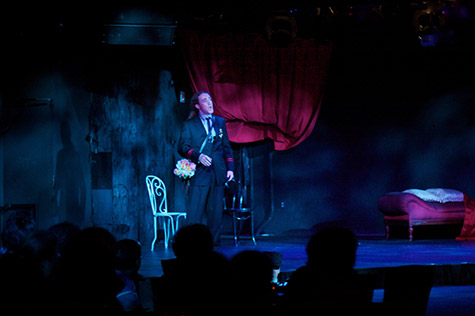
I do think that the three shows that we produced, especially Poppea, helped to kickstart this wave of small opera companies in New York. We were at the forefront of this back in 2008, especially in the middle of the recession, so I’m proud of that. I’m really happy to have helped started that wave.
We’ve also talked from time to time about reviving Poppea; almost 10 years later, I can look back and see things that could be improved, but it’s still one of my favorite productions.
Where do you consider home nowadays?
Officially, I’m a New Yorker and I’m there often when I’m not in production. I also have family in Pittsburgh and Puerto Rican. There’s something great about coming back to Pittsburgh for work and I’d love to work in New York more, but there are a lot of artists in NYC who’d like to do that, too, and many of us have to work on the road.
I travel even when I’m not working, because I have family connections that I like to maintain. It’s a tricky life – you have to love travel, because otherwise it’s too difficult getting uprooted every 3-4 weeks.
How many suitcases do you condense your life into while on the road?
Right now, I’ve been on the road since July 31 and will continue on the road until November 4. It’s unusual for me to be on the road that long.
I have 2 checked bags and 2 personal item carry-ons for the plane this time. Usually, I try to keep it to 1 checked bag, but because of weight limits I decided not try and fight that. I went from Santa Fe to San Antonio to Boston already, and then I’m going on to Omaha, Nebraska. (Opera Omaha is the co-producer for this production of Tosca.)
How did that co-production come about?
The co-production was set after I came onboard; Boston Lyric Opera approached me first, and then a few weeks later Opera Omaha asked to go in for a co-production with Boston and asked me if I was also available to direct. It was serendipitous…but there are two different seasons between those cities, so I need the extra suitcases!
And hopefully there are no mental notes like “Oh, God…I’ll fix that in Nebraska.”
[Laughs] Of course, the venues are different sizes and the casts are different sizes, so there’ll be some changes. I have the most rehearsal time in Boston, so I’ll work out the challenges and joys that come with a new production while I’m here. I think Nebraska will be pretty smooth.
What is your 30-second pitch for this opera?
My pitch is that this opera is about a strong woman who finds herself in a tangled web and her only way out is to use her strongest mental capacity to achieve that out. I think that’s something that is universal, no matter what time period you’re talking about. I think that’s really exciting.
The way that we’re presenting this story and these characters is very accessible to audiences, and I’m really excited to see how the audience reacts to that and this interpretation.
—
Boston Lyric Opera’s production of Tosca opens October 13 and plays through October 22 at the Cutler Majestic Theatre in Boston, MA.

